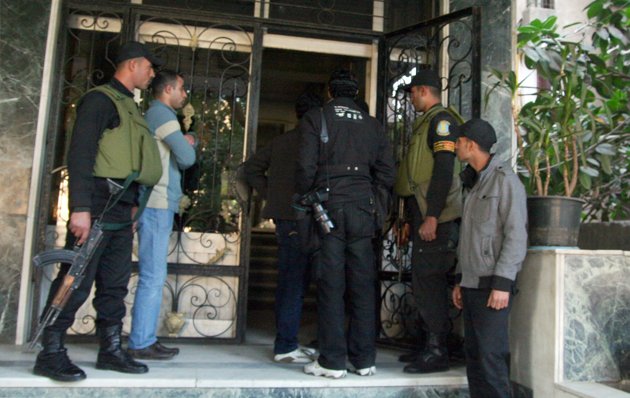
A headline on the front page of independent daily Al-Shorouk refers to the final stage of People’s Assembly elections, beginning tomorrow in nine governorates, as "The third-phase war."
About 14.5 million voters are supposed to head to the polls on Tuesday and Wednesday to elect 150 candidates — 100 list-based and 50 single-winner candidates.
Similarly to the first two rounds, the Muslim Brotherhood’s Freedom and Justice Party (FJP) and the Salafi-led Nour party are in fierce competition.
However, according to the report, an increasing number of candidates from the dissolved National Democratic Party have entered the race in the third state, relying on the support of tribal groups that traditionally backed the NDP.
Other elections-related news making headlines in Monday’s newspapers is the Supreme Council of the Armed Forces (SCAF) announcement that Shura Council elections will be shortened to two phases in an attempt to accelerate the power transfer from military rule to civilian government.
Independent Youm7 writes that each stage will be held over two days, with the first stage being held on 29 and 30 January and the second on 14 and 15 February.
The runoffs, in case no candidate receives a majority, are scheduled for 7 and 22 February for the first and second phases respectively.
State-owned Al-Akhbar has exclusive coverage of the collapse of the façade of the Egyptian Scientific Institute, running a picture of the building on the front page.
On the fifth page, the paper provides more details, stating that the top facade of the building collapsed during the restoration process due to the deep cracks caused by the recent fire. No casualties were reported.
The paper adds that while most of the complex’s walls can be restored, some need to be completely reconstructed to avoid a repeat of this incident.
The restoration has been ongoing since protesters set fire to the building while under attack from military forces on Qasr al-Aini Street last month.
Last week, the offices of civil society organizations and NGOs were raided to allegedly investigate their acceptance of foreign funding without permits.
Minister of Planning and International Cooperation Fayza Abouelnaga held a joint press conference with Justice Minister Adel Abdel Hamid on Sunday in response to criticism from human rights groups and foreign countries regarding the crackdown. State-run Al-Ahram quotes Abouelnaga as saying, “The authorities have acted within the law … the SCAF are not part of the inspection mission.”
However, independent Youm7 quotes a human rights organization chief as saying that “the military council launched these raids to hurt civil society organizations’ images after these organizations worked to reveal military violations that occurred both before and since the revolution.”
Al-Tahrir, a privately owned paper, sheds light on the changing stance of the Muslim Brotherhood on granting the SCAF more authority in drafting the new constitution.
“The military has the right to enjoy a special position in the upcoming constitution, more than in previous ones,” FJP Vice Chairman Essam al-Erian is quoted as saying.
In his statement to Al-Tahrir, Erian stressed that handing power to an elected civilian authority in July “should not result in the disappearance of the SCAF from the political scene.”
The Brotherhood’s permissive stance with regard to the military ruler raises eyebrows and seems to be a reversal of the group’s earlier position. In November, the Islamist group raised fierce objection to supra-constitutional principles proposed by former Deputy Prime Minister Ali al-Selmy that would provide the SCAF and the military with considerable power and protection under the new constitution.
The Brotherhood, along with Salafi organizations, boycotted discussions of the document and organized a massive demonstration against it on 18 November.
In an op-ed, Youm7 Editor-in-Chief Khaled Saleh lends his support to an initiative scheduled to be launched Monday evening at El Sawy Culture Wheel that aims at restoring the peaceful spirit of 25 January revolution.
“The revolution’s peacefulness is its only hope for victory. The ongoing conflicts do not have any real results … except inflicting casualties, hurting the credibility of demands for change and lessening the revolution’s popularity,” he writes.
Saleh believes that the initiative, introduced by activists hoping to regain the trust of the masses, represents a new beginning.
Egypt's papers:
Al-Ahram: Daily, state-run, largest distribution in Egypt
Al-Akhbar: Daily, state-run, second to Al-Ahram in institutional size
Al-Gomhurriya: Daily, state-run
Rose al-Youssef: Daily, state-run
Al-Dostour: Daily, privately owned
Al-Shorouk: Daily, privately owned
Al-Wafd: Daily, published by the liberal Wafd Party
Youm7: Daily, privately owned
Al-Tahrir: Daily, privately owned
Freedom and Justice: Daily, published by the Muslim Brotherhood's Freedom and Justice Party
Sawt al-Umma: Weekly, privately owned
Al-Arabi: Weekly, published by the Nasserist Party




